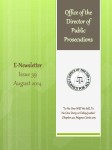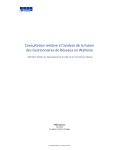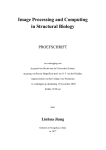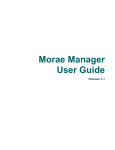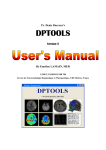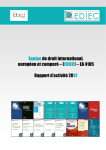Download Issue 31 - Office of the Director of Public Prosecutions
Transcript
Office of the DPP December 2013 Issue 31 EDITORIAL TEAM: THE MONTHLY Mrs Sulakshna Beekarry-Sunassee Principal State Counsel LEGAL UPDATE Mrs Zaynah Essop State Counsel Mr. Ashley Victor Public Relations Officer EDITORIAL SUB-COMMITTEE: NEWSLETTER DECEMBER 2013 Mr. Nitish Toolsee Bissessur Mr. Toshan Rai Bundhun Mr. Yashvind Kumar Rawoah “To No One Will We Sell Mr. Ajmal Toofany To No One Deny Or Delay Justice” Legal Research Officers Chapter 40, Magna Carta 1215 Table of Contents Editorial INSIDE THIS ISSUE: EDITORIAL 3 CRIME AND PUNISHMENT 4 RAJSOOMER LALLAH ANNUAL LECTURE BY KEIR STARMER QC 5 MAURITIUS BAR CONFERENCE 2013 AFRICA PROSECUTORS ASSOCIATION’S CAPACITY BUILDING INSTITUTE: “PROTECTING THE VULNERABLE - GENDER AND SEXUAL BASED VIOLENCE CRIMES MAPUTO, MOZAMBIQUE” 8 DISABILITY INSPIRATIONAL AND MOTIVATIONAL COACHING 9 LE PRINCIPE FONDAMENTAL DU DROIT A LA VIE INCLUT-IL LE DROIT DE MOURIR? 10-11 CASE SUMMARY 12-16 HIGHLIGHTS OF 2013 17-19 Issue 31 Issue 31 6-7 December 2013 2 EDITORIAL “To no one will we sell, to no one deny or delay justice.” Chapter 40 Magna Carta 1215 Dear Readers, 2013 is reaching its end. It is a year which has been full of ups and downs for many of us. However, what matters is that we keep on learning from our personal experiences, that we grow and that we never give up no matter what. The Office of the Director of Public Prosecutions has had its share of challenges too this year. It has been a hectic year with a number of activities organized. A highlights of this year’s activities has been provided to you in this issue. In this last newsletter of the year 2013, we provide you with interesting details of Mr Keir Starmer QC’s visit to our Office in November and an update of the successful Bar Conference held at Intercontinental Hotel. Mrs December 2013 Johan Moutou-Leckning, Senior Assistant DPP and myself, have the pleasure to share with you our experience of the conference held in Maputo, Mozambique by the Africa Prosecutors Association on ‘Protecting the Vulnerable - Gender and Sexual Based Violence Crimes.’ On the occasion of the international day of persons with disabilities, the ODPP hosted a presentation by Mr Mervyn Anthony on ‘Disability motivational and inspirational coaching.’ This issue also includes the article of the month on ‘le principe fondamental du droit à la vie inclut-il le droit de mourir?’ Finally, this issue provides you with the usual summary of the latest Supreme Court judgments. On behalf of the editorial team and all the officers of the ODPP, I wish you all a Merry Christmas and a happy new year 2014. May this new year bring you joy, love, prosperity and good health. We also wish to thank 3 you for having been with us throughout the year and for your constant support. Issue May31this saying of Nelson Mandela be our driving force for 2014, ‘it always seems impossible until it’s done.’ Zaynah Essop State Counsel Issue 31 Crime and Punishment The case of a ten year old stabbing to death a male adult of 50 has unleashed a flood of interesting and not so interesting comments from numerous quarters and at the same time highlighted the anxiety of the population as to the inadequacy of our laws to deal with such cases. I undertake in this short article to offer an insight on the factors that are taken into account before a case of that nature is decided. A reading of the two relevant sections of our penal code, sections 44 and 45 which deal with the prosecution of minors under the age of 14, clearly pre-supposes that in Mauritius a child under the age of 14 can be prosecuted for a criminal offence. The ultimate question is whether the child acted with or without discernment. It is a matter for the jury to decide whether discernment exists in a case of murder or manslaughter. What is discernment? In simple terms, it is the capacity of the child to understand the consequence of his or her action, an ability to distinguish good from evil. Guidance is normally sought from medical experts, psychologists and very often from probation officers. How is a case involving a child suspected of homicide decided? Once the police enquiry is over and the case submitted to my office, the decision whether to prosecute or not, is taken on the basis of two important considerations, namely (a) the sufficiency of the evidence; and (b) the public interest in putting a child under 14 on trial before a jury. The first consideration is an assessment of the quality of the evidence, its reliability and credibility. It is based on the prosecutor’s objective assessment of the evidence, including the impact of any defence and any other information that a suspect may have put forward to buttress his or her defence. The public interest component addresses essentially the best interest and welfare of a child. As a rule, it is recognized that the criminal justice system should treat minors differently from adults and that significant weight must be attached to the age of the suspect if he is under the age of 18 or 14 for that matter. The best interests and welfare of a child implies such consideration as to whether a prosecution is likely to have an adverse impact on his or her future prospects that may be disproportionate to the seriousness of the offence. There are strong reasons militating against sending a child to face a court if he or she has committed a petty offence such as a shoplifting for the first time. But that may not necessarily be the case for more serious offences especially where it is not the child’s first encounter with the authorities. The bottom line is that the younger the person the less likely it is that a prosecution is required. Additionally the prosecutor must take into account the obligations of Mauritius arising under the UN Convention on the Rights of the Child in particular articles 3, 9,12, 37 and 40 and other relevant international instruments such as the Beijing rules. A decision involving a child offender cannot be taken lightly and only after a full review of all the factors mentioned above. In the case of the little girl suspected of homicide the police enquiry is still in progress. A decision to prosecute or not can only be considered after all the circumstances of the case are fully enquired into including the submission of medical and psychological reports relating to the issue of discernment. Satyajit Boolell SC, DPP Issue 31 4 Rajsoomer Lallah Annual Lecture by Mr Keir Starmer QC The first annual Rajsoomer Lallah memorial lecture was delivered by Mr Keir Starmer QC, former UK DPP, on 28th November 2013 on the theme of ‘Human rights, victims and the prosecution of crimes in the 21st century.’ Judges of the Supreme Court, members of the Judiciary, the UK High Commissioner, several senior counsel and state counsel from the Attorney General’s Office and the Office of the Director of Public Prosecutions attended the function. At the outset of his speech, Mr Keir Starmer QC paid tribute to the impressive achievement of late Rajsoomer Lallah as a human rights advocate, both locally and internationally. He iterated the fact that late Rajsoomer Lallah was committed to the development of international human rights law, both as a member of the United Nations Human Rights Committee for many years and as a UN Special Rapporteur. Addressing the theme of ‘Human rights, victims and prosecution of crimes in the 21st century’, Mr Starmer QC argued that, ‘victims’ rights present a fundamental challenge to the basic criminal justice model which has been in place in most common law countries for decades, if not centuries; that key developments in victims’ rights would not have taken place without the positive approach of human rights law (compared to the negative freedoms approach of the common law); and that the re-adjustment of our criminal justice arrangements to accommodate victims’ rights, whilst well and truly under way, is far from complete.’ Mr Starmer QC identified four aspects of our criminal justice arrangements which are of critical importance to victims. They are as follows: (a) the criminal law itself; (b) the investigation of individual allegations of crime; (c) the decision of the prosecutor whether or not to bring criminal charges against a suspect; and (d) the hearing before the court. He considered that unless the law adequately and effectively protects the rights of victims, there can be no question of a criminal investigation and prosecution, a proposition which was accepted by the European Courts of Human Rights as far back as 1985. Such recognition resulted in the adoption of the UN Declaration on Justice for Victims by the UN General Assembly. The aim of the Declaration was to ensure that all victims have access to the justice system as well as support throughout the justice process. The lecture of Mr Starmer QC will be the subject matter of review and comments in the Mauritius Criminal Law Review which will be launched early next year. Issue 31 5 Mauritius Bar Conference 2013 The annual Mauritius Bar Conference was held on the 29th and 30th of November 2013 at the Intercontinental Resort. The conference was attended by a plethora of professionals of the legal world. It proved to be an excellent platform as it allowed the speakers to provide fascinating insight into some of the “hot topics” in the legal profession. After the keynote address by Maura McGowan, the first plenary session kicked off with a highly relevant topic: “Access to Justice”. The speakers of that session were namely Mrs Touria Prayag, Mr Keir Starmer QC, and Mr Satyajit Boolell SC. While Mrs Prayag focused her speech on how access to justice is perceived in Mauritius, Mr Keir Starmer QC emphasised the importance of ethics in legal system. Mr Boolell pertinently tackled the issue of delay in this intervention. They all agreed on the growing significance of communication and cooperation between all stakeholders. The second plenary session of the day was titled “Interworkings within profession.” Distinguished speakers such as Premila Balgobin and Danielle Lagesse SA considered the relationship amongst the different actors within the profession and highlighted some potential areas of improvement. The specialist sessions explored a wide spectrum of subjects ranging from public law to gender issues.On day one, three specialist sessions were held. During the first one “Public Law, chaired by Mrs Aruna Narain, the speakers delved into issues of constitutional and human rights law. The second one focused on commercial law and speakers such as Mr Gilbert Noel and Mr Jason Harel took up the interesting question of structuring investment and private client wealth management through Mauritius. The closing session for that day, chaired by Mr Anwar Moollan concentrated on civil law namely all aspects of civil procedure, enforcement and execution issues. The second day of the conference welcomed two more plenary sessions and five specialist sessions. The third plenary session of the conference veered towards a more international dimension, focusing on the international aspects of legal practice. This session chaired by Mr Marc Hein assessed our organisation and competitiveness in light of other international approaches. This assessment exercise was helpful in considering the position of Mauritian law firms. An analysis of the different types of organisation of law firms was also provided. The last plenary session dealt with the challenges within the profession. During this particular session chaired by Mr Herve Duval, practical Issue 31 6 Annual Mauritius Bar Conference issues such as the organisation of the lawyers, prospective entrants and opportunities within “the out of court” organisations were raised. The first specialist session of the second day dwelled on criminal law. The session chaired by Mr Satyajit Boolell SC covered focal issues such as the role of the Prosecutor in upholding the Rule of Law, white collar crimes, rights of victims of crime and ethics concerning the representation of barristers. The following session focused on arbitration and was chaired by Mr Duncan Bagshaw. Opportunities for the Mauritian Bar were discussed. Mrs Premilla Patten chaired the 6th specialist session about gender issues. Mrs Moutou-Leckning and Mrs Maura McGowan QC among others explored issues of gender bias in various legal and social institutions. A session about taxation and financial law chaired by Mr Rajesh Ramloll was next. It highlighted the importance of tax treaties and the regulation of the legal framework of the sector. Last but not least, the session about legal literacy chaired by Mr Eric Ribot SC underlined the effectiveness of awareness programmes, mentoring sessions and campaigning when it comes to understanding the legal system. It is also worth mentioning that the Bar Conference paid tribute to the stalwarts of the legal profession namely: Sir Rampersad Neerunjun QC, Sir Gaetan Duval QC and Mr Madan Gajadhur QC. Nadiah Ramsamy Law Research Officer Issue 31 7 Africa Prosecutors Association’s Capacity Building Institute: “Protecting the Vulnerable - Gender and Sexual Based Violence Crimes Maputo, Mozambique” The Africa Prosecutors Association (APA) organised a conference on the theme of ‘protecting the vulnerable against gender and sexual based violence crimes.’ The conference was held from 13th to 15th November in Maputo, Mozambique. Mrs Johan Moutou-Leckning, Senior Assistant DPP and Mrs Zaynah Essop, State Counsel, from the Office of the Director of Public Prosecutions attended the conference. Prosecutors from various African countries were present and they included Mozambique, South Africa, Zambia, Angola, Tanzania, Democratic Republic of Congo. The main objectives of the conference were to ensure that each country had the ability to deal decisively with offenders who largely depend on the capacity of stakeholders who have to ensure appropriate victim management as well as efficient offender accountability and that the approach that needed to be implemented was one that focused on the existence of an enabling legislative and policy framework, institutional capacity, skilled and empathetic personnel. The conference was chaired by advocate Thoko Majokweni, special director of the sexual offences and community unit in South Africa. Various presentations were also made by advocate Xolisile Khanyile, Director of Public Prosecutions in the Free State, South Africa. Mrs Khanyile explained the various steps and measures taken for the prosecution of sexual abuse cases in South Africa. In Mauritius alike, their criminal legal system is an adversarial one which makes it traumatic for victims of crime to testify about the most intimate details of a sexual offence. She emphasised the importance of providing adequate support and measures to victims of sexual abuse cases which would include the giving of evidence in camera and the use of age-appropriate language when asking questions. The representatives of each country were also requested to make a brief presentation of their respective laws on sexual offences, human trafficking and domestic violence. Johan Moutou-Leckning, Senior Assistant DPP & Zaynah Essop, State Counsel Issue 31 8 Disability Inspirational and Motivational Coaching La journée internationale des personnes autrement capables proclamée par les Nations Unies, qui se tient annuellement le 3 décembre, a été marquée au bureau du DPP par une présentation axée sur le concept « Disability Inspirational and Motivational Coaching » délivrée par Mervyn Anthony, luimême officier au sein de cette institution. La particularité ainsi que l’engouement qu’a suscitée l’évènement réside dans le fait que Mervyn a une déficience auditive caractérisée par la perte totale du sens de l’ouïe et un handicap physique cérébrale. Ce jeune homme élégant à l’allure plutôt joviale est le détenteur d’un « Certificate in Management », d’un « postgraduate diploma » ainsi que d’un « Masters in Business Administration ». C’est avec énormément d’enthousiasme et d’assurance que Mervyn s’est adressé à son audience, leur faisant part de l’impacte de son handicap sur son parcours professionnel et de sa lutte constante dans son insertion sociale. Les capacités physiques et intellectuelles de Mervyn sont remarquables d’autant que son outil de communication est la parole et la vue. Se prononçant de cette manière, Mervyn déclare qu’il n’entendra jamais les mots qui sortent de sa bouche. « Je vous écoute avec mes yeux », nous confie-t-il, ayant maitrisé la faculté de lire sur les lèvres. Mervyn nous apprend que le handicap est une opportunité d’être différent et de réussir différemment. Le seul véritable obstacle selon lui est la mauvaise attitude, synonyme d’auto sabotage et de dévalorisation de ses capacités réelles. Pour Mervyn, le handicap ne doit pas constituer une excuse afin d’éviter d’entreprendre ce que l’on désire. La détermination, la tenacité, la confiance en soi sont des éléments, parmi d’autres, qui forgent l’esprit de « leadership ». Ce brillant jeune homme a su s’approprier ces qualités afin de bâtir la forte personnalité qu’il renferme aujourd’hui. En relatant ses souvenirs d’enfance, Mervyn nous explique que bien souvent l’encadrement académique et social lui avait inculqué l’idée « d’impossibilité » que ce soit au niveau de son insertion ou bien même de se faire comprendre. Cependant, son attitude de battant a pris le dessus sur ces aspects négatifs, faisant de lui un « winner ». Mervyn aspire non pas à être un « barrister » mais un « outstanding barrister ». Il est plus que déterminé à réussir et affirme avec beaucoup de conviction que ce n’est pas son handicap qui l’empêchera de se faire entendre par les juridictions. Il a déjà élaboré un moyen très perspicace de communiquer lors des plaidoiries. Le bureau du DPP est honoré d’avoir de tels officiers, talentueux et rempli d’avenir. Nous lui souhaitons une carrière couronnée de succès et de surtout continuer à être une source d’inspiration. Ajmal Toofany, Law Research Officer Issue 31 9 Le Principe Fondamental du Droit à la vie inclut-il le Droit de Mourir? Telle était la question soulevée lors du ‘Rajsoomer Lallah Annual Memorial Lecture 2013’ qu’on tenterait de répondre au cours de cet article. De prime abord, il faut savoir que les libertés fondamentales énoncées par la Convention Européenne des Droits de l’Homme (CEDH, 1953) sont basées sur un système corrélatif. A vrai dire, chaque principe fondamental est vêtu d’un corollaire. A titre d’exemple: On est libre de s’exprimer (Article 10 CEDH) à condition de ne pas commettre une diffamation; On a un droit à la vie privée (Article 8 CEDH) qui peut être mise en cause par le biais d’une perquisition à domicile,... L’esprit de l’article 2 de ladite Convention veut que le droit à la vie soit un droit inaliénable dans la mesure où ce principe est immédiatement articulé à l’interdiction de la peine de mort. Néanmoins, ce n’est pas un principe absolu car cet article prévoit trois exceptions résiduelles notamment: i) la légitime défense; ii) l’état d’inserruction ou de guerre; iii) l’empêchement de l’évasion d’un détenu. Cependant, ces exceptions limitativement énoncées sont sujettes à un élargissement dès lors qu’existe l’incorporation du principe de la dignité humaine dans la notion de vie et de mort. Ce constat justifie l’intervention du droit à défaut duquel on risque de dériver à des problèmes éthiques et juridiques majeurs (Euthanasie activement pratiquée ou avortement non soumis à des conditions préalables). Ainsi, la vraie question est de savoir si le droit de vivre dignement est un corollaire du droit de mourir avec dignité? Pour répondre à cette question il conviendrait de voir comment le droit protège le corps humain: (I) Avant la Naissance; et (II) Durant la Vie en passant par une analyse du droit comparé. (I) Avant la Naissance: L’interruption Volontaire de Grossesse (IVG) C’est une constatation évidente que l’IVG ou l’avortement oppose le droit à la vie au droit à la mort voire le droit de la femme enceinte de disposer de son corps au droit du fœtus. Pour certains juristes l’embryon et le fœtus ne sont pas considérés comme des sujets de droit autonomes et distinctes du corps de la mère. En ce sens, la Cour de Cassation, en France, refuse de condamner pour homicide involontaire un gynécologue qui avait précipité par erreur l’avortement d’une patiente (Cass.crim,30 juin 1999). Néanmoins, la Cour Européenne des Droits de L’Homme proclame le principe selon lequel « la liberté d’avorter était une liberté fondamentale qui se dégage de la Convention » (CEDH, 5 septembre 2002, BOSO c/ Italie). La législation française opte pour cette conception libérale de l’avortement. Ainsi, l’article 223-10 du Code Pénal français actuel, consacré à l’IVG, est seulement conditionnée au consentement éclairé de l’intéressé car les autres conditions sont à portée subjective. Concernant l’avortement illicite, même si la loi pénale française prévoit les mêmes peines d’emprisonnement que ‘le criminal code’ mauricien (en occurrence 5 ans d’emprisonnement). L’approche mauricienne ,cependant ,semble être plus pragmatique que l’approche européenne. La législation nationale précise en effet les cas de figure précis où l’avortement devient licite notamment: si la grossesse met en danger la vie de la femme enceinte; la prévention d’une naissance d’un enfant gravement handicapé; anormalité physique ou mentale du fœtus; la grossesse n’a pas excédé 14 semaines; l’hypothèse d’une mineure enceinte (section 235A Criminal Code). Issue 31 10 Le Principe Fondamental du Droit à la vie inclut-il le Droit de Mourir ? Le Principe Fondamental du Droit à la vie Par Nitish Bissessur, Legal Research Officer sous la supervision de le Droit de Mourir ? Meinclut-il Ram Rammaya, Ag senior state counsel II) Durant la Vie: Le cas du suicide et de l’euthanasie. La notion du droit de mourir passe par la distinction selon laquelle :A) la personne est viable (le cas du suicide); B) la personne est assistée médicalement (l’euthanasie). Le suicide ou le meurtre de soi-même n’est punissable ni en la personne de l’agent ni en celle du complice. Le suicide n’étant pas un délit pénal, la tentative de suicide échappe également à la peine faute d’un texte incriminateur. En effet, le suicide n’entre dans le domaine du droit que lorsqu’il fait intervenir un autre individu. Sur le terrain national, le seul texte envisageable en cas de suicide par l’assistance d’un tiers est la section 39A(2) du Criminal Code sanctionnant la ‘non-assistance à personne en danger’ de 2 ans d’emprisonnement. En France, suite à la publication d’un livre en 1982 intitulé « Suicide, mode d’emploi », le législateur intervient en introduisant les articles 223-13 et 223-14 dans le code Pénal Français réprimant respectivement la provocation au suicide et la propagande en faveur des moyens à se donner la mort de 3 ans d’emprisonnement. En revanche, lesdits délits sont des délits de résultat car l’incrimination nécessite la mort de l’intéressé. Une telle législation serait vivement envisageable au niveau national car à l’origine de chaque suicide existe une raison et qu’en est-il si la raison émane de la provocation d’une autre personne? Peut-on légitimer l’euthanasie? La Cour Européene des Droits de L’homme répond par l’infirmatif dans un arrệt datant du 29 avril 2002(Pretty c/ Royaume-Uni) en estimant « qu’il n’est pas possible de déduire de l’article 2 de la Convention (relatif au droit à la vie) un droit de mourir, que ce soit de la main d’un tiers ou par l’assistance d’une autorité publique ». Néanmoins, trois pays européens (Pays-Bas, Luxembourg, Belgique) autorisent l’euthanasie à la demande du patient sur le fondement du droit de mourir avec dignité et non dans un état dégradant. D’autres pays la règlementent en utilisant la formule d’euthanasie passive. Ainsi, en France l’euthanasie est encadrée principalement par une loi de 2005 dites Loi Léonetti qui dispose que « le médecin….peut renoncer à poursuivre des traitements qui apparaissent inutiles, disproportionnés ou qui n’ont d’autre objet que le maintien artificiel de la vie ». Cependant, en 2013, les penseurs sociaux en France se penchent pour un suicide médicalement assisté (Yves Clarisse: La Législation du Suicide assisté en France, Le Point.fr, publication 16 décembre 2013). Dans ce sphère, le Président du Comité Consultatif National d’Ethique a proposé un projet de loi au Président Français selon lequel ’’toute personne majeure en phase avancée ou terminale d’une maladie incurable, provoquant une souffrance physique ou psychique insupportable et qui ne peut ệtre appaisée, puisse demander dans les conditions précises à bénéficier d’une assistance médicalisée pour terminer sa vie dans la dignité ‘’. Une telle législation risque de laisser porte ouverte à des dérives dangereuses au niveau local car une grande place est laissée à la décision médicale qui peut s’avérer subjective. On peut tout de même conclure que dès lors que le comportement d’un individu porte préjudice à autrui le droit peut intervenir mais le droit peut difficilement intervenir si l’acte de l’individu est causé à lui-même. Nitish Bissessur, Legal Research Officer Issue 31 11 Case Summary RUMMUN v THE STATE [2013 SCJ 406] By Hon. S. B. Domah and Hon. S. Bhaukaurally for the prosecution. With regard to the second factor, the court held that it cannot be gainsaid that the offence and the circumstances of its perpetration should be a matter of seri- Larceny with an offensive weapon; sentencing; delay; breach of constitutional right ous concern in our criminal justice system. Concerning the third factor it was held that, in the absence of sentencing The Appellant was convicted before the Intermediate Court guidelines on the range of sentence that would be applicable for the offence of larceny with an offensive weapon. He was to the offence, the sentences vary from 6 months imprison- sentenced to undergo 4 years penal servitude and the sen- ment to 8 years for the same offence and therefore the cus- tence was maintained by the Supreme Court on appeal. The todial sentence of four years is warranted. Finally with re- Appellant appealed to the judicial committee of the Privy spect to the fourth factor, the Court referred to the case of Council on the ground that in view of the substantial delay Elaheebocus v the State of Mauritius [2009 UKPC 7] where which had occurred in the case, his constitutional right had the Judicial Committee distinguished that case from Boolell v been breached. The State [2006 UKPC 46]. The Judicial Committee consid- The Judicial Committee of the Privy Council considered that with regards to this issue three matters had to be considered, (1.) the complexity of the case, (2.) the conduct of the appellant and (3.) the conduct of the administrative and judicial authorities. The board considered that the “unduly complex” nature of the case had not been raised. The board found that appellant’s conduct was “passively acquiescent” to several postponements although not “actively complicit” in delaying the trial. It was also considered that prosecution authorities were responsible for much of the delay. The case was remitted by the Board for examination on the following factors: (1.) a close examination of the reasons for the delay; (2.) the ranking of the seriousness of the offence against the breach of the appellant’s constitutional right; (3.) guidelines regarding the range of sentence which would have been appropriate; and (4.) an adjustment in the range so as to reflect the breach. ered the offence in Elaheebocus as of greater criminality than that in Boolell and concluded: “ […] their Lordships on balance think it right to mark the undoubted constitutional breach in this case by making a modest reduction in the sentence to be served. In the result they quash the four-year term and substitute for it a term of three and a half years’ penal servitude, such sentence now to be served without further delay. To this extent and to this extent only the appeal is allowed.” The Judicial Committee gave guidance as to the weight to be attributed to a serious offence when ranked with the constitutional breach and held that “[…] the delay in this case constitutes a breach of the appellant’s constitutional right. A breach of that right will always be a factor to be considered in deciding upon the appropriate disposal. In some instances it may not be a factor of great weight and there may even be some cases in which, because of the strength of countervailing factors such as the gravity of the offence, it will be ac- With regard to the first factor, the court observed that the postponements were mostly due to the other co-accused’s corded no weight at all. But it will always be a factor to be considered”. absence and only slightly in part to the absence of witnesses Issue 31 12 Case Summary Taking into account all the factors and the circumstances of the case and of the appellant, the sentence was substituted for a sentence of 3 years penal servitude, from which the time spent on custody ought to be deducted. VAYAVERY v THE STATE [2013 SCJ 412] By Hon. N. Matadeen and Hon. N. Devat Sexual intercourse with specified person; assessment of credibility of a victim of sexual offence The Appellant was charged with the offence of sexual inter- GOPEE v THE STATE [2013 SCJ 407] course with a specified person in breach of section 249(5) (a) By Hon. S. Bhaukaurally, Judge & Hon. D. Chan Kan Cheong, (c (i) of the Criminal Code to which he pleaded not guilty. He Judge was sentenced to three years penal servitude. The Complain- Insult ant averred that when she was 14 years old, she had sexual intercourse with her the appellant, her biological father, on This is an appeal from a judgment of the learned Magistrate three occasions. Appellant appealed against his conviction. of Upper Plaines Wilhems (Curepipe Division) convicting the appellant of the offence of insult in breach of section 296(a) of the Criminal Code. He was sentenced to pay a fine of Rs 500 and was ordered to pay Rs 100 as costs. One of the grounds of appeal was the Learned Magistrate erred in concluding that the expression “piss ar li” amounted to an “Insult”. Counsel for the appellant challenged the learned magistrate’s appreciation of the evidence adduced and the assessment of the credibility of the complainant. The learned magistrate noted that complainant was alive to the inconsistencies in the prosecution’s case but these were of minor importance and had no consequential impact on her credibility. However learned magistrate acted on the testimony of the The judges had no doubt from the tenor of the judgment of the learned Magistrate that he had the necessary experience to attribute the exact contextual meaning of the mentioned expression that should be attributed to the words and to complainant whom she found credible. The learned judge observed that the findings of the trial court on the contradictions and inconsistencies and the assessment of the complainant’s testimony were impeachable. come to the conclusion that they amounted to an insult. They found no reason to disturb his finding on this issue. All the grounds of appeal had failed and the appeal was dismissed with costs. Two other grounds of appeal were to the effect that learned magistrate was wrong to convict the appellant in the absence of corroborative evidence having regard to the nature of the charge against the appellant. The learned judges considered that caution was exercised by the learned magistrate when dealing with uncorroborated evidence of a victim in a sexual case. The learned magistrate could be faulted for having relied on the sole testimony of the complainant to reach a finding of guilt against the appellant and there was no mis- Issue 31 13 Case Summary direction on the issue of corroboration. The appeal was dismissed. the case of consecutive sentencing, this falls also under the principle of totality. Thus, where a court is minded to impose consecutive sentences, it should ensure that the cumulative effect of consecutive sentences for multiple offences does ROOPCHAND v THE STATE [2013 SCJ 416] By Hon. A.Caunhye, Judge & Hon. S.B. Domah, Judge Principle against double counting and principle of proportionality This is an appeal against a sentence of 5 months’ imprisonment imposed by the learned magistrate of Upper Plaines not exceed the overall guilt of the offender. The cumulative effect of the consecutive sentences imposed turned out to be unduly long and harsh in the circumstances. Fifteen months (5 months for each count) for an offence of middle gravity offends the principle of totality, though the previous convictions of the offender would be unduly long and harsh, taking into account the mitigating factors. Wilhems under each of the three counts under which the appellant stood charged for issuing cheques without provision in breach of section 330B of the Criminal Code. She further ordered the terms of imprisonment under each count to ENERGY ENGINEERING INVESTMENT LTD v SANCHIS J P [2013 SCJ 426] run consecutively. The appeal was based on only one ground namely that the By Hon. R. Mungly-Gulbul and Hon. N. Devat sentence is manifestly harsh and excessive and wrong in principle. The Judges considered that there was no good reason for imposing a consecutive sentence imposed in this case. Application for new trial; duty of appellant; error; interests of justice They ordered the appellant to serve a term of 5 months un- This was an appeal against a decision for setting aside an der each count and the sentence to run concurrently. The application for new trial. The appellant made an application points that the Judges took into consideration before amend- for a new trial on the following grounds: (1.) a bona fide er- ing the sentence were as follows: ror as to the date of continuation, (2.) a strong defense to Principle against double counting: The manner in which the the plaint and (3.) a new trial being in the interest of justice. learned magistrate carried out her exercise offends the princi- Determination of application for new trial ple against double counting. The Court reasoned that “all the facts and circumstances of the case, the law and case law in the matter” and further that “the offences concerned are of the same nature, involving substantial sums of money and the short interval of time between each of the offences.” The principle of proportionality: In the view of the Judges, there has been a breach of the principle of proportionality The Appellant claimed that it was his conduct rather than that of its legal advisers which had to be analyzed for the determination of the application for a new trial and that learned magistrate wrongly applied the case of Margaret Toumany and John Mullegadoo v Mardaynaiken Veerasamy [2012 UKPC 13] and the case of Sawmynaden Ramen v Ghoorun [2000 SCJ 185]. which is an overriding principle in sentencing an offender. In Issue 31 14 Case Summary It was held the defendant had its greater share of responsibil- New trial in the interests of justice ity in keeping track of the case and failed in his duty to ascer- It was submitted by counsel for the appellant that the tain the proper date of the trial from his attorney as well as in learned magistrate should have granted the application for his duty to peruse the court record and note down the date new trial in the interests of justice in as much as (1.) the ab- of the trial. Remarks made in the case of Sawmynaden Ra- sence of the appellant was not due to any laches on his part, men v/s Ghoorun and Margaret Toumaney v Marday Naiken (2.) the sum awarded is substantial and (3.) the appellant Veerasamy (supra) to the effect that ‘counsel’s conduct must had a good a bona fide defense to the claim. It is a settled not be unfairly reflected on the litigant unless there is at least principle that “When a litigant has obtained a judgment in a some indication of negligence on his part as well’, did not find court of Justice … he is by law entitled not to be deprived of their application in the present case. that judgment without very solid grounds” [Brown v Dean New trial on the ground of error A.C. [1910], 373] but the reasons set out above by appellant were considered to be very solid grounds warranting a new Counsel argued that the case was being treated as one of forgetfulness rather error and did not therefore consider that trial and that it would be in the interests of justice that a new trial be granted. the situation fell within the ambit of rule 62 of the Supreme Court rules which provides for new trial on the grounds of “fraud, error and violence.” Based on Halsbury Laws of England 3rd Edition Volume 30 Practice and Procedure page 475 paragraph 891, “a new trial may be ordered if a substantially wrong verdict has been given owing to one party having been taken by surprise, or owing to the misconduct of a party or his solicitor or Counsel, or owing to the discovery of fresh evidence which could not with reasonable diligence have been discovered before the trial, or owing to some inadvertence, mistake or slip in the proceedings”. The case of Grimshaw v Dunbar [1953] 1 AER (page 350 at page 355) was referred to and the following extract was reproduced: “If by some mischance or accident […] an order is made in his (the party) absence then common justice demands, so far as it can be given effect to without injustice to other parties, that that litigant who is accidentally absent should be allowed to come to the Court and present his case, no doubt on suitable terms as to costs…”. The judgment setting aside the application was quashed, the appeal was allowed and a new trial ordered. It was held that the situation was not one of forgetfulness but rather reveals a genuine confusion and mistake on the part of the counsel with respect to the date of trial, thereby falling RAMSAMY P M v THE STATE [2013 SCJ 436] By Hon. A. R. Hajee Abdoula, Judge & Hon. P. Fekna, Judge under the meaning of rule 62. Appellant was laboring under the mistaken belief that the case was fixed for the wrong Appeal; Manifestly harsh and excessive sentence. date. The Learned judge agreed that the magistrate had This was an appeal where the appellant stood charged be- made a wrong appreciation of the evidence in concluding that fore the Intermediate Court together with three other ac- the circumstances did not disclose any “error” within the am- cused parties in an Information containing four counts. The bit of rule 62. Issue 31 15 Case Summary other three accused were charged under counts 1-3 whereas sentence. the appellant was charged under count 4 with the offence of Learned counsel for the applicant contended that sentence possession of articles obtained unlawfully in breach of sec- of penal servitude for life should be reviewed and replaced tions 40, 301(1), 305(1) (b) and 301A of the Criminal Code. He by a sentence of penal servitude for not more than twenty pleaded guilty and was sentenced to undergo 9 months im- years, given the fact that the applicant (a) had been detained prisonment and to pay Rs 500 as costs. on remand since his arrest 1997, (b) was aged 30 at the time The appeal was based on only one ground namely ‘that the of the commission of the offence, (c) readily cooperated with sentence was manifestly harsh and excessive’. The Judges the police and confessed to the commission of the offence were therefore of the view that the sentence imposed by the (d) had a clean record at the time of the commission of the learned Magistrate in that case was neither harsh nor exces- offence and (e) has not committed any breach of prison disci- sive nor wrong in principle. They accordingly dismissed the pline. The Applicant had acted as a courier to convey a con- appeal. The reasons were as follows: siderable amount of drug from India to Mauritius. The Appli- The appellant had already been fine twice. Two years later, he got involved in what appears to be a series of possession cant had, during his period of imprisonment, been guilty of ten breaches of prison discipline. of stolen property cases spread out over a short period of Mitigating factors such as consideration of age, clean record time. of the appellant at the time of the offence and his confession The court sentenced the appellant for the present offence were taken into account but however the offence was con- taking into consideration all facts. The court took into account sidered to be a serious one. It was held that, pursuant to the overall conduct of the appellant in the period November section 5(3) of the Criminal Procedure (Amendment) Act 2008 – June 2009 as well as his failure to mend his ways since 2007, the sentence of penal servitude for life be substituted he was last fined. by a sentence of penal servitude for a term of twenty-two years. The applicant’s time demand on remand was imputed SHAIK A.M. v STATE OF MAURITIUS [2013 SCJ 452] By Hon. K.P. Matadeen, (Acting Chief Justice) and Hon. N. Devat Application for review of sentence Applicant was convicted for the offence of unlawfully im- from the sentence. ‘I learned that courage is not the absence of fear, but the triumph over it. The brave man is not he who does not feel afraid, but he who conquers that fear.’ porting dangerous drugs in breach of section 28(1) (c) of the Dangerous Drugs Act 1986 and sentenced to penal servitude for life. An application is made under section 5(1) of the Crim- Nelson Mandela inal Procedure (Amendment) Act 2007 for a review of the Issue 31 16 Highlighs of the Year 2013 1 4 3 2 5 6 1. Launching ceremony of ‘Tanya so Zistwar’ 2. Visit of Uganda delegation at ODPP 3. Courtesy visit of Dr Oberoi at ODPP 4. MOU signature between Asset Recovery Enforcement Authority, FIU and MRA 5. Distribution of ‘Tanya so Zistwar’ at College du St Esprit, Riviere Noire 6. 7th Asia/Africa IFA Conference held at Hilton Mauritius Resort & Spa Issue 31 17 Highlights of the Year 2013 1 2 3 4 6 5 7 8 1. Visit of Judge Abdullah Malleck Goolab Ahmed at the ODPP 2. Advocacy training with Neil Davey QC and Anthony Moore 3. MOU signature between ODPP and Prosecutor General Office of the Russian Federation 4. Meeting with Attorney General of England and Wales in Moscow 5. Official visit of the DPP in Rodrigues 6-8. Visit of Mr Keir Starmer QC Issue 31 23 Highlights of the Year 2013 1 2 3 4 5 1. Football competition - The ODPP Team 2-5 Team building activities Issue 31 18 THE ODPP TEAM WISHES YOU A MERRY CHRISTMAS AND A HAPPY NEW YEAR 2014 !!! Issue 31 19






















